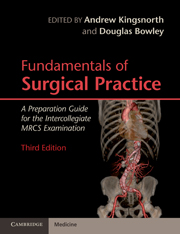Book contents
- Frontmatter
- Contents
- List of contributors
- Preface
- Section 1 Basic Sciences Relevant to Surgical Practice
- Section 2 Basic Surgical Skills
- Section 3 The Assessment and Management of the Surgical Patient
- Section 4 Perioperative Care of the Surgical Patient
- Section 5 Common Surgical Conditions
- 16 Assessment and early treatment of patients with trauma
- 17 Fundamentals of the central nervous system
- 18 Fundamentals of head and neck surgery
- 19 Fundamentals of thoracic surgery
- 20 Oesophago-gastric surgery
- 21 Fundamentals of hepatobiliary and pancreatic surgery
- 22 Fundamentals of endocrine surgery
- 23 Fundamentals of the breast
- 24 Lower gastrointestinal surgery
- 25 Fundamentals of the genitourinary system
- 26 Hernias
- 27 Fundamentals of vascular surgery
- 28 Fundamentals of orthopaedics
- 29 Fundamentals of plastic surgery
- 30 Surgical care of the paediatric patient
- 31 Fundamentals of organ transplantation
- Index
28 - Fundamentals of orthopaedics
Published online by Cambridge University Press: 03 May 2011
- Frontmatter
- Contents
- List of contributors
- Preface
- Section 1 Basic Sciences Relevant to Surgical Practice
- Section 2 Basic Surgical Skills
- Section 3 The Assessment and Management of the Surgical Patient
- Section 4 Perioperative Care of the Surgical Patient
- Section 5 Common Surgical Conditions
- 16 Assessment and early treatment of patients with trauma
- 17 Fundamentals of the central nervous system
- 18 Fundamentals of head and neck surgery
- 19 Fundamentals of thoracic surgery
- 20 Oesophago-gastric surgery
- 21 Fundamentals of hepatobiliary and pancreatic surgery
- 22 Fundamentals of endocrine surgery
- 23 Fundamentals of the breast
- 24 Lower gastrointestinal surgery
- 25 Fundamentals of the genitourinary system
- 26 Hernias
- 27 Fundamentals of vascular surgery
- 28 Fundamentals of orthopaedics
- 29 Fundamentals of plastic surgery
- 30 Surgical care of the paediatric patient
- 31 Fundamentals of organ transplantation
- Index
Summary
Introduction
The aim of this chapter is to introduce the reader to orthopaedic surgery. Core training in orthopaedics has four key topics, all concerned with trauma rather than elective surgery. This chapter will cover the topics:
Simple fractures and dislocations
Soft tissue injuries, including open fractures and compartment syndrome
Ankle fractures
Proximal femoral fractures in the elderly.
Fracture healing
Fracture healing is a complex physiological process, and unlike other tissues that heal by the formation of connective scar tissue of poor quality, bone is regenerated and the pre-fracture properties are usually restored.
Fractures can heal by:
primary direct bone healing
secondary (callus formation) bone healing.
The vast majority of fractures heal by secondary bone healing, which proceeds in five distinct stages:
stage 1: tissue damage and haematoma formation
stage 2: inflammation and cellular proliferation
stage 3: callus formation
stage 4: consolidation
stage 5: remodelling.
Tissue damage and haematoma formation
Bleeding occurs from the medullary cavity, the periosteum, as well as adjacent soft tissue and muscle. This results in the formation of a haematoma within and around the fracture site. The disruption of the Haversian systems leads to death of the osteocytes at the fracture surface.
Information
- Type
- Chapter
- Information
- Fundamentals of Surgical PracticeA Preparation Guide for the Intercollegiate MRCS Examination, pp. 521 - 536Publisher: Cambridge University PressPrint publication year: 2011
